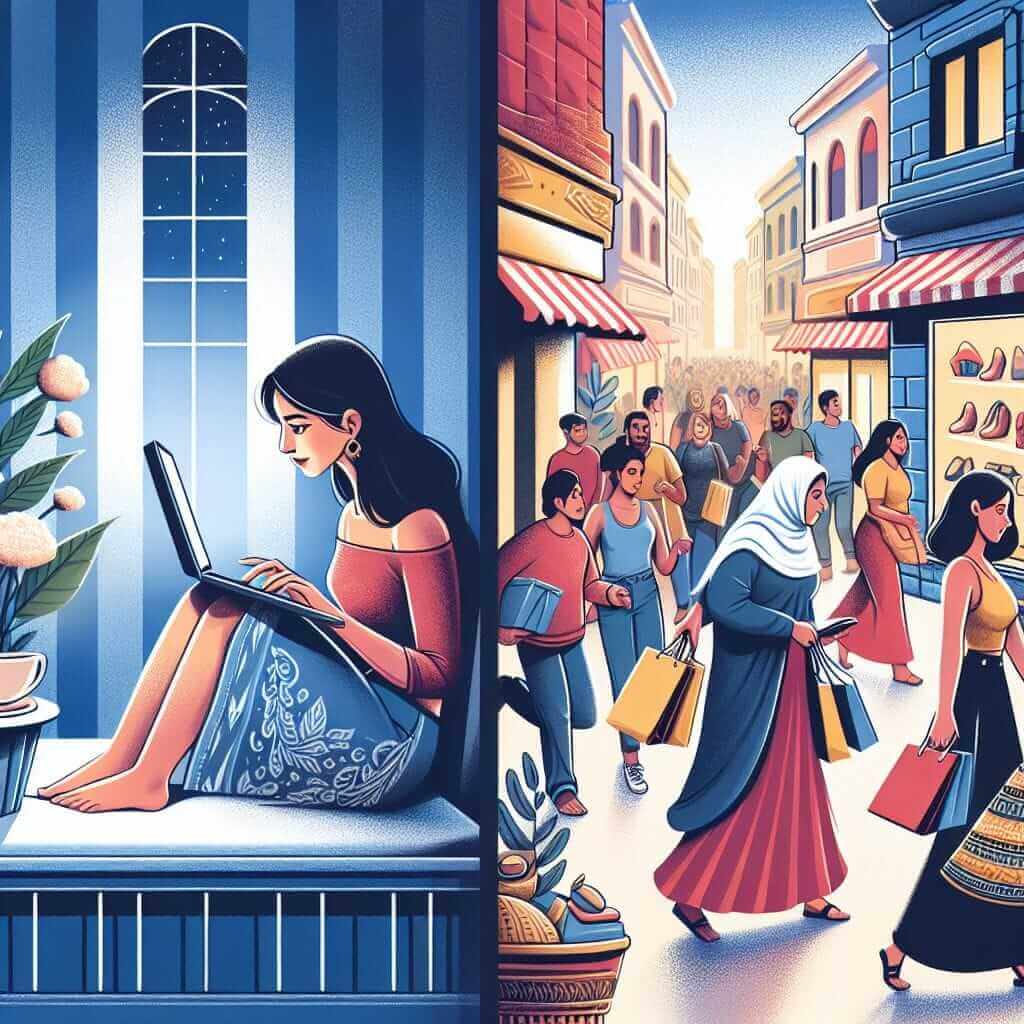The pervasive nature of the internet has led to a surge in online shopping, profoundly impacting traditional retail. This topic frequently appears in IELTS Writing Task 2, requiring test-takers to analyze and discuss the advantages, disadvantages, and overall implications of this shift in consumer behavior.
Here are some potential IELTS Writing Task 2 questions related to this topic:
- To what extent do you agree that online shopping has only had negative effects on traditional retail?
- Discuss the advantages and disadvantages of both online shopping and traditional retail.
- What measures can traditional retailers take to compete with the rise of e-commerce?
Sample Essay: Analyzing the Impact
Let’s delve into a sample essay addressing the first question:
To what extent do you agree that online shopping has only had negative effects on traditional retail?
Essay Analysis
This question requires you to present a balanced argument, acknowledging both the positive and negative impacts of online shopping on traditional retail. It’s crucial to avoid simply listing advantages and disadvantages; instead, focus on providing a nuanced discussion that explores the complex relationship between these two modes of shopping.
Model Essay
The advent of online shopping has undeniably revolutionized the retail landscape, leading some to argue that its effects on traditional brick-and-mortar stores have been entirely detrimental. While it’s true that e-commerce poses significant challenges to traditional retail, to claim that its impact is solely negative would be a simplification of a complex issue.
On the one hand, online shopping has undeniably contributed to the closure of numerous physical stores. The convenience of browsing and purchasing goods from the comfort of one’s home, coupled with the often wider selection and competitive pricing offered online, has lured many consumers away from traditional retail outlets. This has resulted in decreased foot traffic and, consequently, financial struggles for many physical stores, particularly smaller independent businesses lacking the online infrastructure to compete effectively.

However, it’s essential to recognize that online shopping has also spurred innovation and adaptation within traditional retail. Many retailers have responded to the rise of e-commerce by integrating their online and offline operations, offering services like click-and-collect and in-store returns for online purchases. This omnichannel approach allows businesses to cater to evolving consumer preferences and leverage their physical store presence to provide a more comprehensive and convenient shopping experience.
Moreover, the decline of traditional retail has paved the way for a resurgence of experiential shopping. As consumers increasingly seek unique and engaging experiences, retailers are focusing on creating aesthetically pleasing and interactive store environments that offer personalized services and foster a sense of community. This shift towards experiential retail demonstrates the industry’s resilience and its ability to adapt to changing consumer demands.
In conclusion, while the rise of online shopping has undoubtedly presented challenges for traditional retail, its impact cannot be categorized as solely negative. E-commerce has driven innovation, forcing retailers to adapt and evolve their strategies to remain competitive. Ultimately, the future of retail lies in finding a harmonious balance between the convenience of online shopping and the unique experiences offered by physical stores. (Word count: 321)
Writing Tips
- Balanced Argument: Ensure you present both sides of the argument, acknowledging both the positive and negative impacts of online shopping on traditional retail.
- Cohesive Paragraphs: Structure your essay with clear topic sentences and supporting evidence for each point.
- Transition Words: Use transition words and phrases to smoothly connect ideas and create a logical flow between paragraphs (e.g., “on the other hand,” “moreover,” “in conclusion”).
- Vocabulary Enhancement: Employ a wide range of vocabulary related to technology, retail, and consumer behavior to showcase your language proficiency.
Challenging Vocabulary
- Pervasive (adjective) /pərˈveɪsɪv/: Spreading widely throughout an area or a group of people.
- Brick-and-mortar (adjective) /ˌbrɪk ən ˈmɔːrtər/: Referring to a traditional store with a physical presence, as opposed to an online retailer.
- Detrimental (adjective) /ˌdetrɪˈmentl/: Causing harm or damage.
- Infrastructure (noun) /ˈɪnfrəˌstrʌktʃər/: The basic physical and organizational structures and facilities needed for the operation of a society or enterprise.
- Omnichannel (adjective) /ˈɒmnɪˌtʃænəl/: Relating to or denoting a type of retail that integrates the different methods of shopping available to customers (e.g., online, in-store, and mobile).
- Resurgence (noun) /rɪˈsɜːrdʒəns/: An increase or revival after a period of little activity, popularity, or occurrence.
- Experiential (adjective) /ɪkˌspɪəriˈenʃl/: Involving or based on experience and observation.
- Aesthetics (noun) /esˈθetɪks/: A set of principles concerned with the nature and appreciation of beauty, especially in art.
- Interactive (adjective) /ˌɪntərˈæk.tɪv/: Allowing a two-way flow of information between a computer and a computer-user; responding to a user’s input.
- Harmonious (adjective) /hɑːrˈmoʊniəs/: Forming a pleasing or consistent whole.
Conclusion
Understanding the impact of online shopping on traditional retail is crucial for successfully tackling IELTS Writing Task 2 questions on this topic. Remember to analyze the question carefully, develop a balanced argument, and support your claims with relevant examples. By familiarizing yourself with the vocabulary and concepts discussed above, you’ll be well-equipped to express your ideas clearly and effectively, ultimately boosting your chances of achieving a high band score.
Continue practicing with different essay questions related to this topic, exploring various aspects such as the environmental impact of online shopping, the role of technology in shaping consumer behavior, and the future of the retail industry in a digitally driven world.